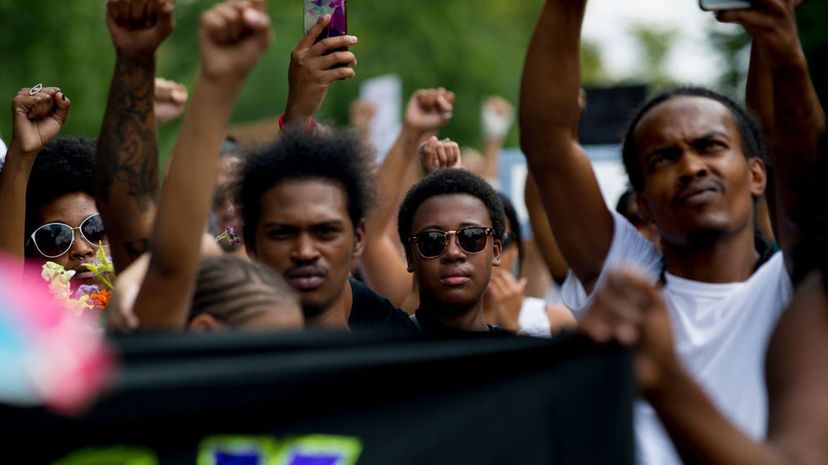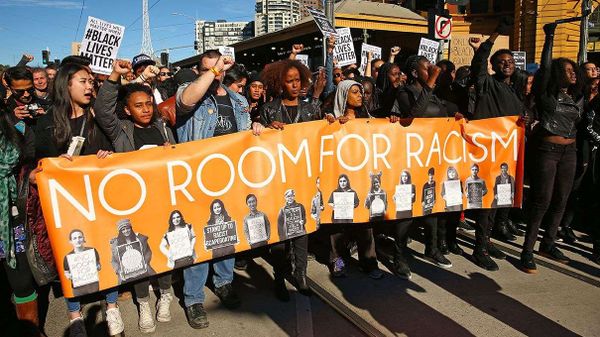
#SayHerName. This hashtag, along with many more, rocked the social media world in the wake of 28-year-old Sandra Bland's suspicious death in 2015 while in police custody in Waller County, Texas. The haunting #ICantBreathe hashtag trended for months in 2014 after an NYPD officer put Eric Garner in a chokehold, ultimately leading to his death. Each of these social media hashtags, which led to real-life protests and debates in society, was birthed by a single entity on the internet: Black Twitter.
Following the 2013 George Zimmerman trial (where Zimmerman was acquitted of the second degree murder of a Black teenager named Trayvon Martin), a writer named Alicia Garza wrote on Facebook in July 2013, "Black people. I love you. I love us. Our lives matter." A friend responded with the hashtag "#blacklivesmatter." Although this started on Facebook, many African-Americans took to Twitter to voice their support and the Black Lives Matter movement was born.
Advertisement
Black Twitter is not a particular hashtag or subgroup on Twitter. It is a social movement that serves as a voice for primarily, although not exclusively, African-Americans to speak out against injustice, as well as issues involving their community that mainstream media does not cover. According to the Media Insight Project, "Only a third of Hispanics and a quarter of African-Americans believe their communities are accurately portrayed in the media, and a major reason for this may be that they feel their communities are not paid much attention in the news."
"Before Black Twitter received its name, its users were simply Black on Twitter," writes the Knight Foundation, in a report about social media among people of color. "The label 'Black Twitter,' in several forms, initiated as a mockery of early observations of the phenomenon that centered the white gaze, such as Choire Sicha's reference to 'late-night black people Twitter.'"
In 2014, a Pew Research Center survey showed that 27 percent of Blacks online were using Twitter, compared with 21 percent of whites and 25 percent of Latinos. African-Americans were the most likely racial group to use Twitter.
Black Twitter users gather to discuss news facing their community and society as a whole. Black Twitter even serves as a main source of news. African-Americans were more likely to get news from social media than other ethnic groups were, according to the Media Insight Project.
Black Twitter's activism extends to other areas besides police brutality and violence. An example of this is the hashtag #OscarsSoWhite, which came about after the 2015 Oscar nominations, where no actors of color were included. The #OscarsSoWhite hashtag spurred the Academy of Motion Picture Arts and Sciences to change the rules regarding who could be an Academy member, as well as add extra seats to its governor's board to increase diversity.
Black Twitter also serves as a forum for entertainment, humor and relatable content. It has been the birthplace for popular hashtags including #AskRachel (a hashtag that surfaced after Rachel Dolezal, a white woman, became an aspiring advocate for Blacks after telling the world she identifies herself as Black woman); #GrowingUpBlack (a series of popular and creative memes of nostalgia and funny memories where African-Americans shared in their upbringing); and #BlackGirlMagic (a hashtag that highlights the many accomplishments of Black women), which was mentioned in the inaugural speech of Atlanta's 60th mayor Keisha Lance Bottoms in 2018.
"Black Twitter is an outlet for the black voice," says multimedia journalist Olivia Steen of the CBS affiliate WHNT in Huntsville, Alabama. "When it comes to social issues, people are able to bring about the change that they want to see simply by making the public aware of it on Twitter."
Steen explains how local news stations use the social platform to get news for their broadcasts. "Mainstream media is supposed to amplify a voice for all people, not just one group. We [WHNT journalists] use Twitter all the time to learn things going on within communities. I look at Black Twitter to see which topics are being discussed so that I can localize it to my area, ultimately helping me develop story ideas and what we cover in the news for our area."
The African-American community has not always had the luxury of being able to utilize the freedom of speech without repercussions. Black Twitter provides not only a community of support, but also a sense of family, education, political and social progression, and even comic relief. And until mainstream media works to acknowledge the issues of the African-American community, Black Twitter will remain a social force to be reckoned with.
Advertisement
